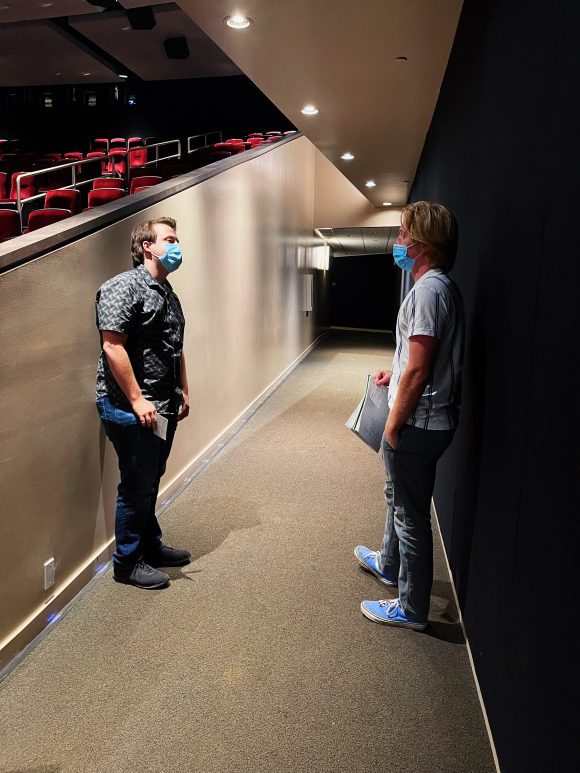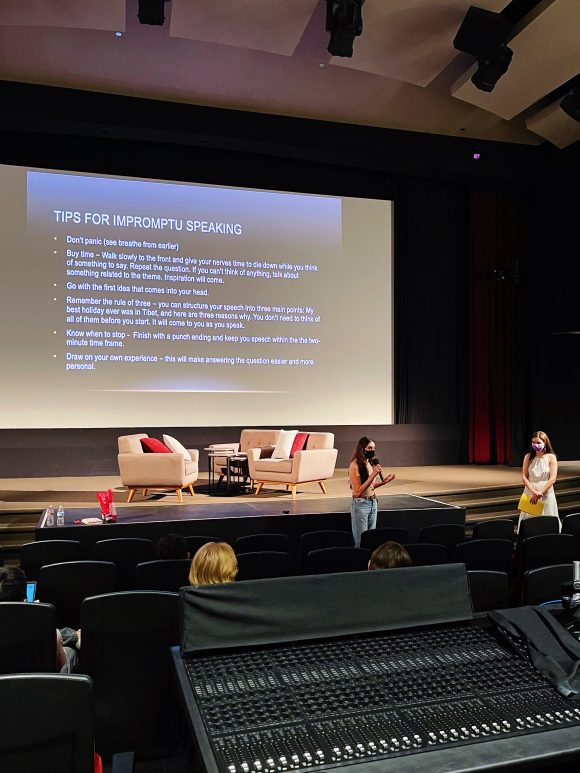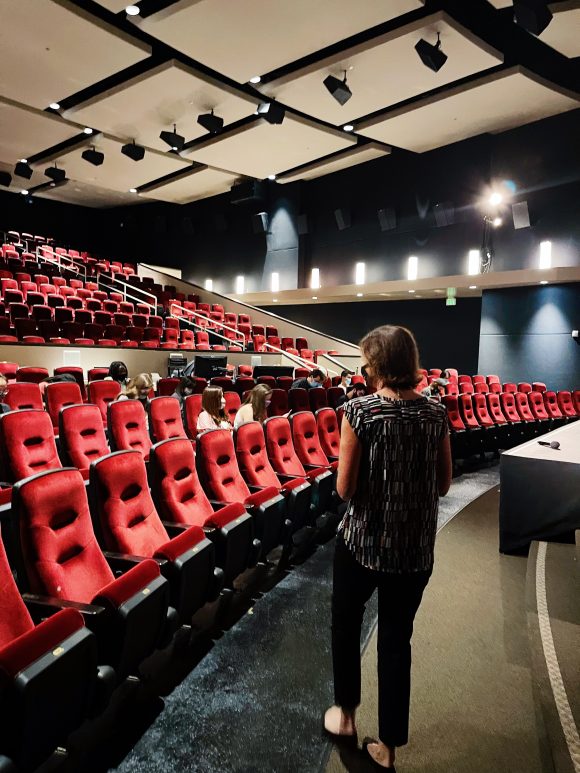7 Tips for Becoming a Great Public Speaker Career Center: Pitch & Present Workshop with Professor Eva Finn
December 8, 2021
On Friday, November 12th, part-time professor Eva Finn hosted the Pitch & Present Workshop in the Folino Theater. Professor Finn teaches PRA 351: Business Presentations and PRA 230: Principles of Advertising here at Chapman University. In fact, two students from Finn’s Business Presentations class, Valerie Chan and Abigail Finnerty, helped demonstrate some of her public speaking techniques during her recent workshop. From her presentation, here are Finn’s seven best tips for becoming a comfortable, confident, and engaging public speaker.

Students creating their own personal loglines to present in front of the group.
#1. Overcoming Nerves
If you were to ask a room full of students where “Public Speaking” falls on their list of biggest fears, it would hold the number one spot for a good percentage of them. Use your nerves to your advantage, Finn said. Take deep breaths. Remember that it is okay to pause. Stay organized. Practice. Everyone is here for you. “You’re rooting for me; I’m rooting for you. Everyone wants you to succeed,” shared Finn.
#2. Presenting With A Mask
It has been everyone’s new normal for the past year and a half to wear a mask at every moment of the day, even when giving presentations. Finn stressed that there is no need to shout when wearing a mask; utilize your eyes and body language in these moments. Finn recommends wearing a comfortable, breathable mask and that whenever you wash it, use something that smells good! Little things like this can boost your confidence in a presentation and relieve stress for however long you’re wearing it.
#3. Don’t Use Crutch Words
All college students remember the struggle of standing in front of a class, nervously presenting a project we just finished last night. The default in this situation is to use crutch words. Phrases like uh, um, you know, so, but, well, er, and so yeah all easily slip out of our mouths without us even realizing. “Embrace the pause,” Finn said multiple times throughout the workshop. She encouraged students to take short breaks throughout a presentation or speech, as this has a more effective outcome than using crutch words.
#4. Use YOUR Power Pose
Power Posing is a technique that suggests how you hold your body influences how you feel or behave. A highlight of the workshop was when Finn got the whole group up on their feet, standing tall with their chests out, and asked them to reach towards the sky. You could feel the release of tension across the theater. After Power Posing, it felt like an entirely new group of students in the Folino seats.

Student Impromptu speaking about their favorite film.
#5. Don’t Be Afraid of Impromptu Speaking
Impromptu Speaking is when someone gives a speech about a topic without preparation. With no practice beforehand, students attending the workshops were called up and asked to give a 2-minute speech about a random film/tv question. Jadon Sand, a Freshman in Screenwriting, said, “Not only did I learn some new techniques and get a little practice, but I feel more prepared to talk about topics I, for lack of a better word, am unprepared to talk about!” Practicing impromptu speaking will help you present better for topics you are unprepared for!
#6. Use “Tell Me About Yourself” to Your Advantage
The most challenging question an interviewer could ever ask someone is also the most common: Tell me about yourself. “Every story has a beginning, middle, and end. So too should your answer to ‘Tell me about yourself?’” said Finn. Students again went in front of the class and gave a short presentation about themselves, and the change in students between their first and second time on stage was clear to see. Jadon Sand told me about how he felt going up in front of the group for a second time: “I was a nervous wreck my first time. My response was really rough, and I was just flying by the seat of my pants and trying not to die. The second time around, I felt much more comfortable. I think it was a combination of actually having prepared something to say and employing new techniques I had learned to a greater extent!”

Eva Finn speaking in front of the audience.
#7. Practice With Loglines
Finn had students in attendance create a logline either for a movie or based on their life experience. As many of us know, loglines are extremely important in the industry to pitch your project quickly and concisely. Having the ability to condense information into a logline, especially when it’s your own personal story, is an excellent way to improve your public speaking.
Michaela Fornaro, a first-year Graduate Student in Screenwriting, told me after the workshop that her expectations on public speaking completely changed after hearing and practicing Finn’s tips. “The workshop showed me that it’s okay to think about your answers and take your time when speaking. It helped take the pressure off the thought of needing to abide by a specific formula.”
If you enjoyed these public speaking tips, keep an eye out for future Dodge Career Center Workshops in Spring 2022!


